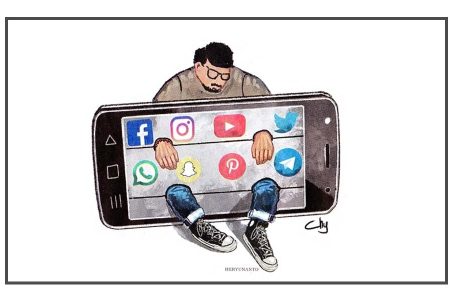The Social Media Paradox
An Article by Divya Dahal
Through social media, users can establish online identities, engage with others, and develop social networks. People who endure isolation, have impairments, or suffer long-term illnesses might significantly benefit from these networks’ invaluable support.
We generally use social media for enjoyment and self-expression. Additionally, the platforms can educate kids about various topics, such as healthy practices, and expose them to current events. They can also enable them to interact across regional boundaries. Teenagers may benefit from using amusing, entertaining, or diverting social media that offers a meaningful connection to peers and an extensive social network.
Some teenagers, especially those who struggle with depression or social anxiety, may tend to spend more time online and have fewer in-person interactions. Increasing their online presence instead of interacting with others, managing difficult situations, speaking up in class or on the job, attending interviews, or resolving conflicts with peers can exacerbate their feelings of alienation, hopelessness, isolation, anxiety, and depression.
The likelihood that you will experience bullying, harassment, or other harmful events increases the more time you spend online. Although there aren’t statistics to show which gender is bullied more specifically, we do know that LGBTQ children are more likely to be singled out for online bullying.
The issue is that social media platforms frequently emphasize analytics more than the people behind the “likes” and “followers,” which might encourage teenagers to publish things about themselves that, true or not, they believe will garner the most attention. Additionally, Prinstein emphasized that these cycles “produce the very opposite attributes needed for healthy and adaptive relationships, namely, they are false, faceless, and depersonalized. In other words, social media provides the “empty calories of social interaction,” which look to satiate our physiological and psychological requirements but do not include any of the nutritional components required to reap the advantages.
Social media platforms like Facebook and Instagram tend to worsen Fear Of Missing Out (FOMO), even though the phenomenon has lasted much longer than social media. Like an addiction, feeling like you’re missing out on particular things can lower your self-esteem, cause worry, and increase your use of social media. FOMO can make you pick up your phone repeatedly to check for updates or compulsively respond to every alert.
Social media platforms keep you online, grab your attention, and keep you checking your screen for updates. It’s how businesses generate money. However, using social media can cause psychological cravings, like gambling addiction or dependence on nicotine, alcohol, or drugs. The same “reward” chemical released into the brain after winning at a slot machine, eating a piece of chocolate, or lighting a cigarette, for example, is released when you get a like, a share, or a positive response to a post. Even if it hurts other areas of your life, you want to spend more time on social media as you are rewarded.
Additional issues like stress, melancholy, or boredom may lurk beneath the surface if you use social media frequently. You may use social media more frequently when you’re depressed, lonely, or bored to block out negative emotions or elevate your mood. Even though it may be challenging at first, allowing yourself to feel might help you discover more effective techniques to control your mood.
Many of us use social media only as a habit or a way to pass the time when we’re idle aimlessly. However, by concentrating on the reasons you use social media, you can not only cut down on the amount of time you spend there but also enhance your experience and steer clear of many drawbacks.
For instance, your experience on social media will likely be very different from when you log on out of boredom to see how many people liked a previous post or to see if you’re missing out on anything if you’re looking for specific information, checking on a friend who has been sick, or sharing new photos of your children with family.
The loop is only kept going by the addictive behaviours. Dopamine’s motivating effects make it difficult to give up technology. Even though we know that using electronics is hazardous for our mental health, this leads to emotions of addiction to them, making it difficult to stop using them. The technology used in moderation can help manage adverse effects, just like everything else. For example, limiting screen usage at least 30 minutes before bed can help to mitigate its adverse impacts on sleep. Reducing social media use to 30 minutes daily considerably lowers typical mental health issues.
Social media platforms frequently push distorted ideas of what beauty should be, leading to eating disorders, body dissatisfaction, and low self-esteem. Constantly being exposed to photoshopped photographs of supposedly ideal bodies can skew judgments of beauty and foster an unhealthy obsession with physical appearance.
It’s crucial to remember that social media’s effects on mental health differ from person to person and that not everyone will suffer harm. But it’s essential to exercise caution when using social media and to strike a balance between it and offline activities. Social media may harm mental health, but they can be lessened by establishing limits, taking regular breaks, and engaging in activities that enhance well-being. If your social media usage adversely affects your well-being, you should also consider asking friends, family, or mental health experts for assistance.
Written by Divya Dahal

